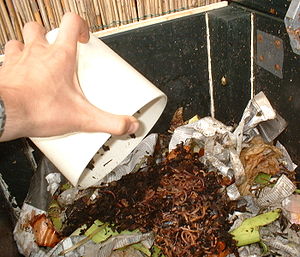Many worm farmers commercially culture worms for profit. Specific breeds of worms are bred and are typically kept in breed specific quarters. Commercially raised worms are typically sold for composting. Some worm farmers distribute to landfills providing a natural method for composting waste.
These specifically bred worms are also used for soil fertilization. As worms dig through the soil, they aerate and stir up the soil carrying water with them. The waste that is composted by the worms is broken down into a substance that can be better used by the soil, improving the fertilization of the soil. A healthy soil is then produced for better growing plants, vegetables and crops.
 Image via WikipediaIn recent years, the supply of worm farming equipment and accessories has made it easier for individuals to make a hobby of this technique. Household sized bins are on the market in a variety of shapes and sizes. Home owners and apartment dwellers have been given the opportunity to raise their own worms for waste compost and soil fertilization.
Image via WikipediaIn recent years, the supply of worm farming equipment and accessories has made it easier for individuals to make a hobby of this technique. Household sized bins are on the market in a variety of shapes and sizes. Home owners and apartment dwellers have been given the opportunity to raise their own worms for waste compost and soil fertilization.Worm farming provides worms with a nutrient rich diet of what many times is thrown out with the garbage including discarded fruits and vegetables. Other compostable materials include paper products and cotton rags, leaves, egg shells and hair. Excreted by the worm is a nutrient rich substance called vermicompost or worm compost.
Worms are also farmed for bait. Small bait and tackle shops often receive their livestock inventory from worm farmers providing fishermen with various worms to use as live bait. Fishermen who fish on a larger scale than the hobbyist often use these worms for bait for anglers and other large catches.
Many different worms are available depending on the job. Each variety of worms is used for its own reasons. Red worms are commonly used for composting while the Belgian worms are good for both composting and bait. Home owners looking for worms to work lawns and flower beds will find success with Night Crawlers and Wigglers.
 Image via WikipediaWorm farming can also be an excellent educational tool. As using worms provide a more space effective way for composting, small kits can be purchased and even hand made to be used in a classroom setting. Students are able to participate in the project learning about how composting occurs. Using natural methods for composting and reducing waste in landfills is easily demonstrated by classroom worm farms.
Image via WikipediaWorm farming can also be an excellent educational tool. As using worms provide a more space effective way for composting, small kits can be purchased and even hand made to be used in a classroom setting. Students are able to participate in the project learning about how composting occurs. Using natural methods for composting and reducing waste in landfills is easily demonstrated by classroom worm farms.Worms can be farmed just about anywhere. With the various systems available on the market today, home owners can raise their own supply of worms outside or in an apartment. Providing the correct amount of moisture, light, bedding, temperature and food will ensure a long living worm population. In return, the reward will be a natural way for composting without filling up local landfills. As a result, nutrient rich soil is provided that can be used right away or stored for use during gardening season.
(Stay tuned to this blog for more on worm farming later this week!)

No comments:
Post a Comment